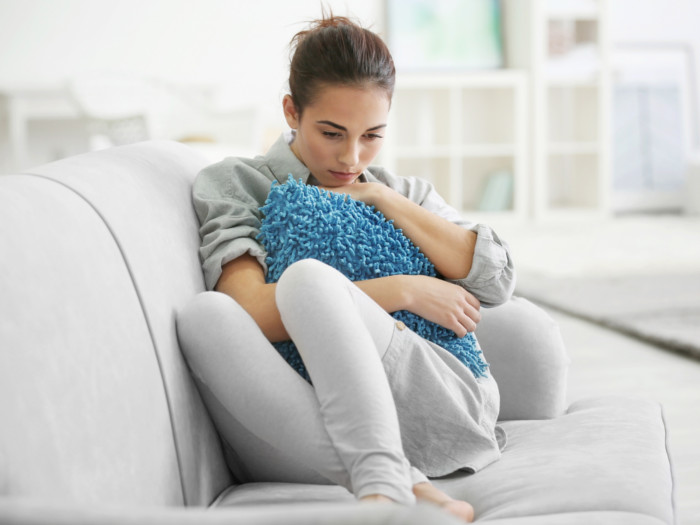Most women suffer from postpartum cramps after delivering a baby. Cramps may be subtle initially but they become increasingly prominent as days go by. You can avoid the unpleasant experience by knowing what causes cramps and how to prevent and treat them at home.
What are Postpartum Cramps?
Postpartum cramps are an uncomfortable pain that women feel after delivery. Cramps are a natural part of body’s recovery process. Mothers who have given multiple births are more prone to develop severe postpartum cramps. However, new moms who have a healthier uterus are less likely to suffer from the same. Although cramps are common among many women, the levels and duration of discomfort caused may vary in degrees.
Cramps mostly manifest in the back, breasts, chests, hips, arms, wrists, legs, and also in your abdominal area and uterus due to the painful contractions.
Reasons for Postpartum Cramping
The most common reasons behind postpartum cramping are stress and weight gain during pregnancy, stretching of ligaments, and involution.
Stress and Baby Weight
During labor, areas like the back and limbs are prone to get affected by stress. This can heavily strain the muscles and result in fatigue. The bones and joints are also affected by the extra weight women put on during pregnancy. These factors may result in an uncomfortable pain in several parts of your body after the delivery.
Loosening of Ligaments
In addition to the strained muscles, cramps can develop because the ligaments naturally stretch during pregnancy and labor, to help in easing the delivery. This can cause a certain degree of pain to the pelvic bones, which results in prominent discomfort while walking and moving around.
Involution
Involution is a pain caused by contractions in the uterus. The uterus can grow up to 25 times its original size during the months leading up to the delivery. In order to revert to its former size, the uterus contracts itself and causes discomfort ranging from mild to severe. Breastfeeding also contributes to the process of uterus contraction, as the baby’s sucking action can release oxytocin, which speeds up the shrinking procedure.
While you may or may not be able to prevent these cramps, you can certainly find relief for it through natural remedies.
Relieving Postpartum Cramping Naturally
Without prescribed medications, you cannot alleviate prenatal cramps completely. However, here are a few home remedies like hot water compress, peeing, herbal teas, breastfeeding, and hot showers that may help. [1]
Peeing
A full bladder can displace the uterus and cause a contraction. Drink plenty of water and try to urinate as frequently as possible. If you regularly empty your bladder, it will lessen the chances of such discomfort.
Hot Water Compress
Use a hot water compress around your abdomen or lower belly area. If you don’t have a standard medical heating pad, you can always use a makeshift warm, cooked rice bag as an alternative.
Herbal Teas
Drink natural herbal concoctions such as green tea to soothe your postnatal pains, lemon tea to boost your immune system, and even warm water to prevent constipation. Beverages such as chamomile tea can help lessen the involution. These warm drinks can alleviate the prevalent cramps while easing the bowel movements as well.
Breastfeeding
Breastfeeding can speed up the shrinking process of the uterus. Your breasts may be sensitive and breastfeeding itself can be painful, but it will help the womb revert to its pre-pregnancy size. So, a routine of breastfeeding will go a long way in preventing painful contractions.
Hot Showers
Take as many long, warm baths as you need. Not only will a bath help you relax, it will also alleviate the cramps by soothing your skin and stopping the internal contractions of the uterus as well.
Sleeping Position
Relax and lie face down when you sleep. Place a soft pillow or a blanket that can easily warm up under your lower belly. It will prevent the uterus from contracting frequently and serve as support for your body.
Massages
Gently massage your lower abdominal area when the uterus contractions start. Apply massage oil on it and gently rub your lower belly in circular motions. This will create some warmth and deter the painful shrinking process of the uterus.
Exercise
Meditate and do gentle exercises. Indulge in deep breathing exercises and mild physical movements that will alleviate your cramps.
Find some time to do these things daily and increase the intensity as you start to feel better. You can try these methods safely at home to relieve your postnatal aches. However, if these methods prove to be completely ineffective, or if the pain persists even after you have tried them, you can consult your physician for prescription medicines and a physical therapy routine that will help you deal with the cramps better.
